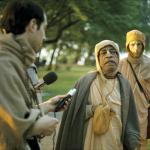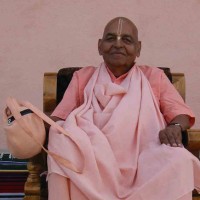
For years the GBC have been arguing that the IRM's position must be wrong because it supposedly breaks the 'law of disciplic succession', which was stated by Srila Prabhupada in a letter to Tusta Krishna Das, and which reads thus:
 |
|
The GBC were also very happy to accept that the restriction on initiating in the presence of one's spiritual master was an integral part of this 'law of disciplic succession', and used this as their main argument as to why devotees could not initate whilst their Gurus were present on the planet. This was stated very forcefully by the GBC in their official paper on the subject of initiation, titled 'Gurus and Initiation in ISKCON' (GII) (1995, GBC). This paper, having analysed Srila Prabhupada's quotes including the one just provided above, states very categorically that:
"From these quotations it is clear that Srila Prabhupada did not want his disciples to initiate, no matter how qualified they may be, as long as their spiritual master was present. [...] It is prudent to assume that Srila Prabhupada was speaking as the Founder-acarya of ISKCON, and that he is restricting all disciples of all gurus in ISKCON from initiating in the presence of their spiritual masters. Even though in the past spiritual masters have given disciples permission to initiate in their presence, Srila Prabhupada emphatically forbids it as a manner of general etiquette. [...] ISKCON is a unique institution in the history of Vaisnavism. We must assume that as Founder-Acarya, Srila Prabhupada had the vision to set down a law--a law suitable for that unique institution, a law we would transgress at our peril. A disciple's only duty is to worship and serve his spiritual master. His mind should not be agitated over how he may become a guru. A devotee who sincerely wants to make spiritual advancement should try to become a disciple, not a spiritual master."
("Devotees Initiating Before Their Guru's Physical Departure: An Official GBC Paper"; Part of GII, GBC, 1995)
So its extremely clear what the GBC believes:
- That under no circumstances should anyone initiate in the presence of their spiritual master. This was Srila Prabhupada's emphatic teaching.
- Even if the devotees are very qualified, or if they have had permission from their own spiritual masters, Srila Prabhupada strictly forbids the practice for ISKCON for all time.
- That this restriction is part of a unique 'law' of disciplic succession given especially for ISKCON by Srila Prabhupada, and we would be trangressing this at our own 'peril'.
- That disciples should simply try and focus on serving their Gurus, instead of being agitated how to become Gurus themselves, whilst their Gurus are still on the planet.
Right? Wrong!
In an amazing U-turn, amazing even for the GBC, they have turned their own words on their head, and decided that it is alright for a disciple to become a Guru even whilst his own Guru is on the planet, after all! As the following sensational announcement by the GBC Chairman, Ramai Swami confirms:
---------- RESOLVED ---------------------------------------------------------------------------- That an *EXCEPTION* has been made in the case of HH Maha Visnu Goswami in "No devotee shall give initiation as long as his own spiritual master is Whereas HH Maha Visnu Goswami is doing dynamic preaching--attracting many to Whereas there are several unique features to the history of HH Maha Visnu Whereas HH Maha Visnu Goswami is often asked for initiation by new devotees; Whereas HH Maha Visnu Goswami is very elderly; Whereas HH Maha Visnu Goswami has displayed allegiance to Srila Prabhupada's Whereas the subject of disciple's initiating in the presence of their Guru "It is hereby resolved that an exception to the present ISKCON law regarding That HH Maha Visnu Goswami is hereby granted a "no objection" to give That all such initiations should follow the standards set by ISKCON law". |
|
 |
This is more proof, if any were needed, how the GBC's philosophical position is a joke. They cannot even decide for themselves:
a) what THEY believe in,
b) what Srila Prabhupada taught,
c) and whether or not the 'law of disciplic succession' is really a law that cannot be broken!